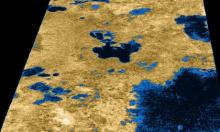As a writer, I can’t get enough of science stories that both fascinate intellectually and stir the creative imagination. When I learned there were diamond oceans with solid diamond icebergs on Neptune and Uranus, my brain went crazy at trying to imagine them. It seems the universe is filled to the brim with scenes whose beauty we can only imagine. The scientific study of planets other than our own not only helps us understand the physical universe, it brings new and strange ideas to the collective human imagination.
Space engineers are now working on the first ever robot boat. It would be shipped off to sail the seas of Titan, the biggest of Saturn’s moons. The potentially NASA-funded Titan Mare Explorer project (TiME) has scientists from Open University and Proxemy Research on board. The goal of the project is to build a probe and then jettison it to Titan on a billion-mile journey. Once landed on the surface, the probe would collect data on one of Titan’s methane and ethane seas. The scientists on the TiME team seek to discover the exact chemical composition of the Ligeia Mare sea that the robot boat would explore. The probe will wield a mass spectrometer to figure out what the lake is made from. It will also record the depth of the sea, the size of its waves, and other variables.
Scientists believe there may be life forms hidden deep within Titan. Surface organic chemicals may trickle down into underground oceans to form living organisms. As Saturn and its moons lie so far away from earth, we have little knowledge so far of what may lurk inside Titan. The project could provide valuable insight as to how worlds with different chemical compositions from our own function.
The project’s proposed scenario sounds like something out of a science fiction novel. A robotic ship sails the chemical seas in search of alien life. TiME may still be in its early stages of development, but it could yield fascinating results as to the secrets of our solar system. While we’re probably the most intelligent beings in discernable proximity, we may not be the only form of life hiding out in our eight-planet system.
The heads of the project are considerably excited that it is making headway in securing funding. These scientists sound like cool dudes, experts devoted to the discovery of the universe around us while not taking everything quite so seriously. The Guardian got the following sound bite from Professor John Zarnecki of Open University: "Waves on Titan's seas will be far larger, but much slower, than on earthly oceans, according to our calculations. That suggests Titan is the best spot in the solar system for surfing. The only trouble is that the temperature there is -180C (-290F).” Maybe his next mission will be launching an insulated surfing capsule. I love the way scientists talk about projects like this one. You get the sense that in certain ways they’re still little kids gazing up at the night sky and dreaming about aliens and spaceships. Becoming a top researcher in space engineering may be a serious endeavor, but that doesn’t mean you have to lose your sense of humor about it. Besides, when facing the prospect of discovering new life on alien worlds, what reasons are there not to be excited?
(via The Guardian UK)
